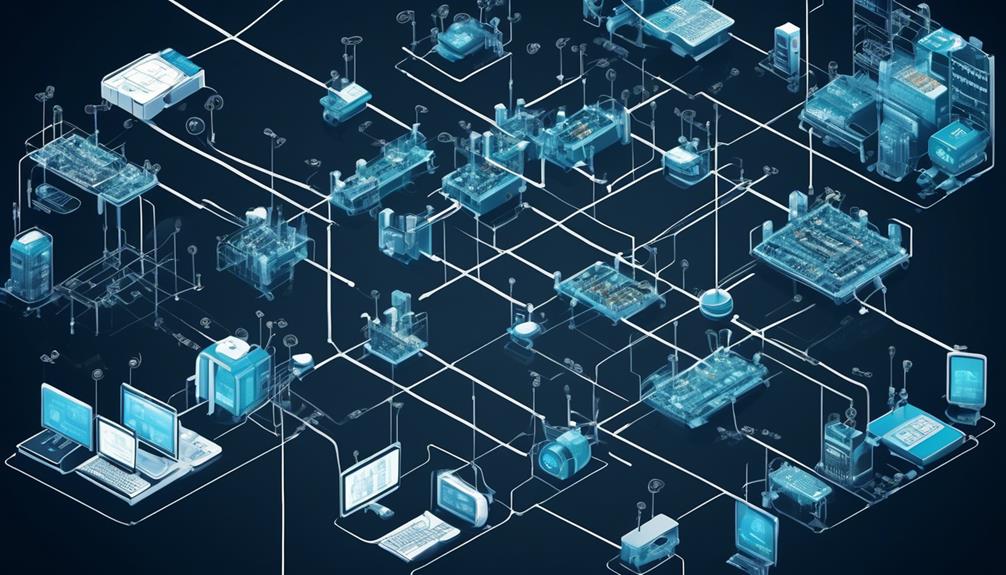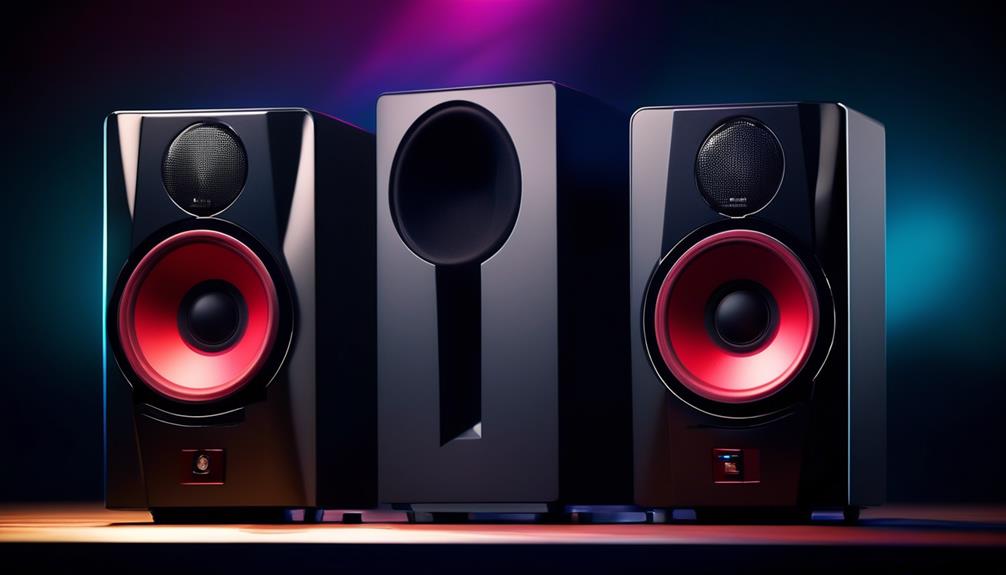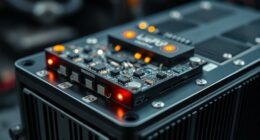As we delve into the intricate world of industrial automation, one cannot help but marvel at the sophisticated operations of a Fieldbus. It acts as the silent maestro, coordinating the smooth communication among different devices without the clutter of individual connections.
But how does this enigmatic system truly operate? What are the underlying mechanisms that enable it to streamline the exchange of data and commands within the industrial landscape?
Join us as we unravel the inner workings of a Fieldbus and gain a deeper understanding of its pivotal role in modern industrial automation.
Key Takeaways
- Fieldbus revolutionizes industrial control by standardizing protocols and reducing excessive cabling.
- The communication protocol is crucial for seamless interaction between field devices and the controller, impacting the performance and efficiency of the network.
- The data exchange mechanism facilitates real-time communication, reducing wiring complexity and costs.
- Fieldbus enables optimized control and automation in industrial processes, enhancing process control, automation, and safety.
Fieldbus Overview
Fieldbus systems revolutionize industrial control by providing standardized protocols for real-time distributed communication, reducing the need for excessive cabling and enhancing device wiring. Fieldbus technology enables the seamless connection of various devices in an industrial control system, allowing for efficient communication and control. With Fieldbus, the number of devices per network can be significantly increased without the need for additional cabling, thereby streamlining the entire process.
Fieldbus offers a range of network topologies, including ring, branch, star, and daisy chain configurations, providing flexibility in designing the control network. This versatility minimizes the complexity of wiring runs, particularly over extended distances, resulting in cost savings and enhanced reliability.
The protocols within Fieldbus, such as ControlNet, Modbus, and Profibus, facilitate the communication between field devices and the programmable logic controller, optimizing the overall control process.
Communication Protocol

When establishing communication within a Fieldbus system, selecting the appropriate protocol is crucial for ensuring seamless interaction between field devices and the programmable logic controller. The communication protocol serves as the set of rules and standards that govern the exchange of data between Fieldbus components.
In the realm of Fieldbus technology, the communication protocol plays a pivotal role in enabling device connection and facilitating real-time communication within the control system.
In the context of process control and distributed control systems, the choice of communication protocol significantly impacts the overall performance and efficiency of the Fieldbus network. Various protocols, such as Foundation Fieldbus, are designed to optimize the transmission of data over serial connections, supporting the integration of diverse field devices into the control system.
By adhering to the communication protocol, Fieldbus components can exchange information in a coordinated and timely manner, ensuring the seamless operation of the entire system.
Ultimately, the communication protocol acts as the cornerstone of effective communication within a Fieldbus network, enabling the reliable and efficient exchange of data between field devices and the control system. It's essential for ensuring the smooth functioning of process control and distributed control systems.
Data Exchange Mechanism
Using standardized protocols, the data exchange mechanisms in fieldbuses facilitate real-time communication between field devices and the central controller. This enables the transfer of sensor readings, control signals, and diagnostic information, ensuring seamless data transmission and reception.
The mechanisms support various network topologies, such as ring, branch, star, and daisy chain, for efficient communication. Additionally, they streamline the connection of multiple field devices to a single communication point, reducing wiring complexity and costs. This is achieved through the utilization of Fieldbus power supply and RS232 serial communication system.
Fieldbus devices, including those utilizing Foundation Fieldbus technology, leverage data exchange mechanisms to exchange information using standardized protocols and function blocks. These mechanisms are designed to accommodate different device types and support a wide range of applications, making them an integral part of how a Fieldbus works.
Control and Automation

Streamlining the connection of multiple field devices to a single communication point, the control and automation aspect of fieldbuses optimizes the real-time distributed control in industrial automation. Fieldbus systems facilitate control and automation by enabling seamless communication between field instruments and control systems. These systems use digital points to efficiently transmit control signals and enable network management for process automation.
The device description language (DDL) plays a crucial role in standardizing the communication between field devices and the control system. Additionally, fieldbuses support the implementation of proportional-integral-derivative (PID) controllers, which are vital for precise control in industrial automation.
As an international standard, fieldbus protocols ensure compatibility and interoperability, allowing for the integration of various field devices and control systems. This harmonized approach to control and automation enhances the efficiency and reliability of industrial processes, making fieldbuses indispensable in modern industrial automation applications.
Industrial Application
In industrial applications, fieldbus systems play a vital role in enabling efficient communication and control between field devices and the central control system, enhancing overall process reliability and productivity. The industrial application of Fieldbus technology offers several key advantages:
- Enhanced Control Network
Fieldbus systems facilitate seamless communication and control between various field devices, such as pressure transmitters, and the central operating system, leading to improved process control and automation within a process plant.
- Safety Instrumented Systems
Fieldbus protocols like Foundation Fieldbus and Profibus PA are integral in implementing Safety Instrumented Systems (SIS) in industrial settings. These systems ensure the safety and reliability of critical processes by enabling real-time monitoring and control of safety-related functions.
In the realm of industrial automation, the use of Fieldbus technology is pivotal for creating interconnected and efficient control networks, ensuring optimal performance and safety within process plants. The implementation of protocols like Foundation Fieldbus and Profibus PA allows for enhanced communication, control, and safety measures, ultimately contributing to the seamless operation of industrial processes.
Frequently Asked Questions
What Are the Two Types of Fieldbus?
There are two types of fieldbus: FOUNDATION Fieldbus and PROFIBUS.
FOUNDATION Fieldbus offers bidirectional communication for real-time control between field instruments and host systems. It utilizes cyclic transmission.
PROFIBUS, on the other hand, is a polling system.
Each type requires specific protocols and communication modules in the controller system.
These distinctions are crucial for understanding fieldbus technologies.
What Is the Difference Between PLC and Fieldbus?
We all know that PLCs and Fieldbus serve different functions, but when it comes to PLC integration and fieldbus communication in industrial automation, the distinction becomes crucial.
PLCs handle control and automation, while Fieldbus facilitates device connectivity and data transmission through its network architecture and protocol standards.
This integration enables efficient signal processing and system reliability, showcasing the symbiotic relationship between PLCs and Fieldbus in enhancing industrial control systems.
What Is the Difference Between Fieldbus and Ethernet?
In comparing Fieldbus and Ethernet, there are key distinctions in data transmission, network protocols, and industrial applications.
Fieldbus enables real-time communication and supports various topologies. It is designed for use in industrial settings and has a data packet structure that is optimized for signal interference, enhancing network reliability.
Ethernet, on the other hand, typically utilizes a star topology. It is widely used in office and home networking and offers high-speed data transmission.
Fieldbus may have a higher installation cost due to its specialized cable infrastructure. Ethernet, on the other hand, has a more standardized infrastructure, which can lead to lower installation costs.
Understanding these differences is crucial for mastering industrial networking technologies.
Is Fieldbus Analog or Digital?
Fieldbus communication isn't confined to just analog or digital – it handles both! Fieldbus technology seamlessly integrates analog devices while transmitting digital signals. This network protocol excels in data exchange, supporting various communication standards.
Its bus architecture efficiently manages signal transmission. Fieldbus technology is a game-changer, enabling seamless device integration.
Conclusion
In conclusion, Fieldbus technology revolutionizes industrial communication by enabling efficient data exchange and control between field devices and programmable logic controllers. Its network structure and protocols facilitate seamless communication, making it a vital component in industrial automation systems.
The impact of Fieldbus in the industrial sector is undeniable, and its continued evolution promises even more advanced capabilities for the future.
Stay tuned for the latest developments in Fieldbus technology!










